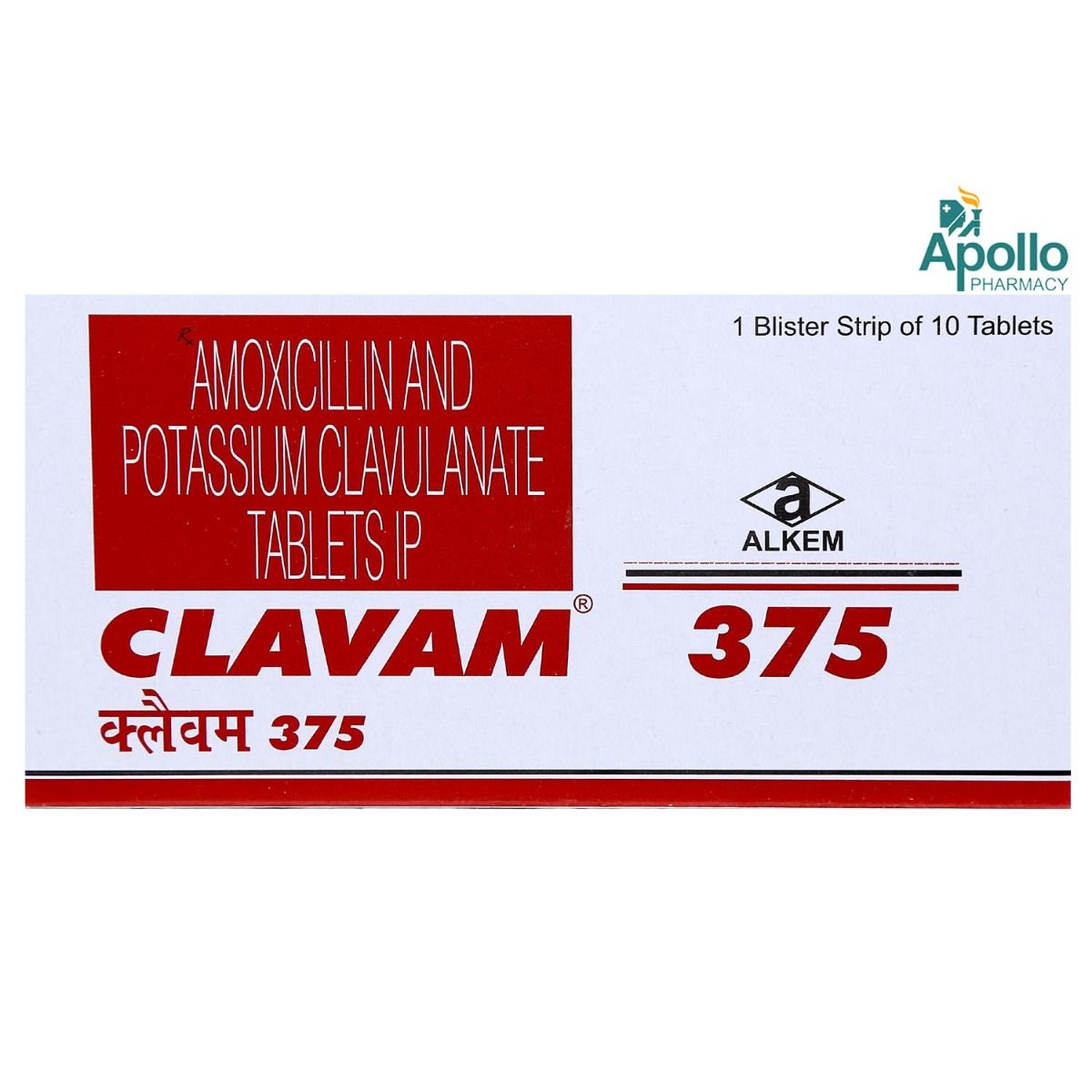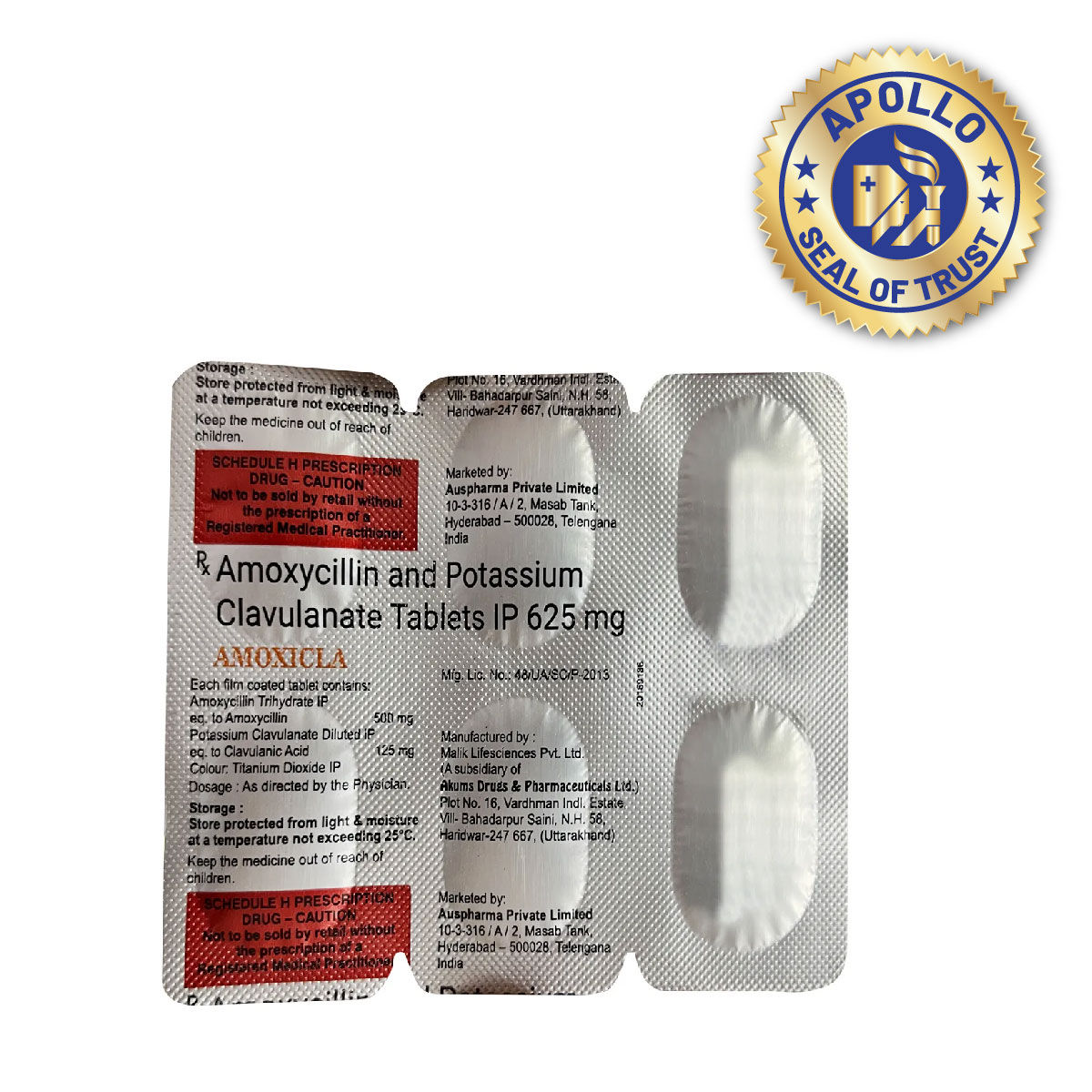Amoxicillin
About Amoxicillin
Amoxicillin belongs to a group of anti-bacterial or antibiotics known as penicillin. Amoxicillin is used to prevent and treat different types of bacterial infections like chest infections (pneumonia, bronchitis), ear/nose/throat (ENT) infections, urinary tract infections, skin infections, leg ulcers, gum ulcers, and dental infections, and pressure sores. Besides this, it is also used with various antibiotics like clarithromycin to treat stomach ulcers caused by H. Pyroli bacteria.
Amoxicillin has a similar method of killing bacteria as penicillin. Amoxicillin kills the bacterial cell by blocking the chemical (mucopeptides) released by the bacteria's outer layer (cell wall). In turn, Amoxicillin weakens and destroys the bacterial cell wall. It is a broad range of antibiotics that helps in fighting various types of bacteria.
Amoxicillin is available in oral tablets, capsules and syrup dosage forms. You should take the syrup form of Amoxicillin as your doctor advises. The tablet or capsule form of Amoxicillin should be swallowed whole with a glass of water. Do not crush, chew or break it. Most bacterial infections get treated within one week, while some conditions might take longer. So, it would be best if you tried to complete the prescribed dosage. During the treatment with Amoxicillin, you may observe some common side effects like feeling sick (nausea) and diarrhoea. But these side effects are usually in the initial phase and then resolve after some time. However, if these side effects persist, let your doctor know. Prolonged intake of the liquid form of Amoxicillin may cause temporary staining of teeth (especially in children) that can be removed by brushing.
You can drink alcoholic beverages while taking amoxicillin, as it does not interact with Amoxicillin. It is generally well-tolerated among adults, children, and pregnant, and breastfeeding women. Do not take Amoxicillin if you are allergic to amoxicillin, or penicillin antibiotics, have liver/kidney problems and had any vaccinations.
Uses of Amoxicillin
Medicinal Benefits
Amoxicillin is a broad-spectrum antibiotic that helps treat various bacterial infections like ear, nose, or throat (ENT) infections, skin infections, genitourinary tract, and lower respiratory tract infections (LRTI) caused by susceptible bacteria. Amoxicillin is effective against gram-positive (S. pneumoniae) and gram-negative bacteria (E Coli, Haemophilus influenza, Neisseria gonorrhoea). Besides this, Amoxicillin also helps treat stomach ulcers caused by the H Pyroli bacteria. And if combined with antibiotics like clarithromycin and acidity, medicine like lansoprazole help reduce the symptoms of duodenum ulcer. Amoxicillin can be safely prescribed and well-tolerated among adults, pregnant and nursing mothers.
Directions for Use
Storage
Side Effects of Amoxicillin
- Feeling sick (nausea)
- Diarrhoea
Drug Warnings
Serious allergic reactions may be reported in patients taking Amoxicillin, including raised itchy skin rashes, wheezing, chest tightness, and coughing. Taking Amoxicillin may cause antibiotic-induced diarrhoea in some cases. Penicillin antibiotics, blood thinners (warfarin, coumadin), uric acid-lowering drugs (allopurinol, probenecid), and anti-cancer or anti-arthritis drugs (methotrexate) may severely interact with Amoxicillin. Tell your doctor if you have chronic kidney disease or viral glandular fever (mononucleosis) before taking Amoxicillin. This medicine may lower the efficiency of oral birth control pills or contraceptive devices. An intake of Amoxicillin may alter some glucose urine tests like the copper reduction test report.
Drug Interactions
Drug-Drug Interactions: Taking Amoxicillin with penicillin antibiotics, blood thinners (warfarin, coumadin), uric acid-lowering drug (allopurinol, probenecid), and anti-cancer or anti-arthritis drug (methotrexate) may severely interact with Amoxicillin.
Drug-Food Interactions: Grapefruit juice and dietary supplements containing minerals like calcium may also work to dampen the effect of antibiotics.
Drug-Disease Interactions: Amoxicillin should not be given in the condition of colitis, glandular fever, and chronic kidney disease. Colitis is characterized by severe diarrhoea and abdominal cramps associated with the passage of mucous and blood via stool or vomiting.
Drug-Drug Interactions Checker List:
Safety Advice

Alcohol
safe if prescribedYou can drink alcohol with Amoxicillin. Do not drink too much while taking this medicine. Drinking a lot of alcohol you may more likely to drowsiness, dizziness or sleepiness side effects.

Pregnancy
safe if prescribedAmoxicillin is a pregnancy category B drug. So, Amoxicillin can be safely taken by pregnant women if prescribed by the doctor.

Breast Feeding
safe if prescribedAmoxicillin can be safely given to breastfeeding mother.

Driving
cautionYou may have side effects like dizziness after taking Amoxicillin that may make you unfit to drive. So, it is advisable not to drive or operate machinery until you are feeling well.

Liver
safe if prescribedAmoxicillin can be safely taken in case of liver disease if prescribed by the doctor.

Kidney
cautionTake Amoxicillin with caution if you have severe kidney disease. Your doctor may reduce the dose of Amoxicillin in patients with severe renal impairment (GFR less than 30 mL/min).

Children
safe if prescribedAMOXICILLIN is available for children in powder for oral suspension form. The dose will be decided by your doctor based on the age, body weight and condition of the child.
Habit Forming
Diet & Lifestyle Advise
- After taking the full course of Amoxicillin, probiotics should be taken to restore some of the healthy bacteria in the intestine that may have been killed. Taking probiotics after antibiotic treatment can reduce the risk of antibiotic-associated diarrhoea. Certain fermented foods like yoghurt, cheese, sauerkraut and kimchi can restore the intestine's good bacteria stink.
- Include more fibre-enriched food in your diet, as it can be easily digested by gut bacteria which helps stimulate their growth. Thus fibre foods may help restore healthy gut bacteria after taking a course of antibiotics. Whole grains like whole-grain bread, and brown rice, should be included in your diet.
- Avoid taking too many calcium-enriched foods and drinks as it might affect the working of Amoxicillin.
- Avoid intake of alcoholic beverages with Amoxicillin as it can make you dehydrated and affect your sleep. This can make it harder for your body to aid the Amoxicillin in fighting off infections.
Patients Concern
Disease/Condition Glossary
Bacterial infections: A bacterial infection is a condition in which harmful bacteria enter, multiply, and infect our body. It can target any body part and multiple very quickly. When you get infected with bacteria, you can experience generalized symptoms like fevers, chills, and fatigue. Bacteria are of various forms comprising commonly spherical, rod, and spiral-shaped. Bacterial infections vary from minor illnesses like sore throat and ear infections to severe brain infections like meningitis and encephalitis. Few harmful bacteria that cause infections include Streptococcus, Staphylococcus, and E. coli. Anyone can become infected with a bacterial infection. But, people with weak immune systems or taking immunosuppressive medicine can make you more prone to bacterial infection.
FAQs
Amoxicillin is used to prevent and treat different types of bacterial infections like chest infections (pneumonia, bronchitis), ear/nose/throat (ENT) infections, urinary tract infections, skin infections, leg ulcers, gum ulcers, and dental infections, and pressure sores. Besides this, it is also used with various antibiotics like clarithromycin to treat stomach ulcers caused by H. Pyroli bacteria.
Amoxicillin kills the bacterial cell by blocking the chemical (mucopeptides) released by the bacteria's outer layer (cell wall). In turn, Amoxicillin weakens and destroys the bacterial cell wall. It is a broad range of antibiotics that helps in fighting various types of bacteria.
Amoxicillin belongs to the class of penicillin antibiotic. Amoxicillin is a broad-spectrum antibiotic effective against a wide range of bacteria. On the other hand, penicillin is a narrow-spectrum antibiotic effective against less number of bacteria.
Do not use anti diarrhoeal until the doctor has prescribed you. You can drink plenty of fluids (electrolytes) to avoid dehydration. Besides this, you can also take prebiotics or probiotics to manage diarrhoea as it may help in increasing the number of good bacteria in the intestine, which aids in digestion.
Yes. If you are taking AMOXICILLIN in liquid form, it can stain your teeth. However, this is temporary and goes off after brushing. It is common in children.
Try to stay well hydrated by drinking at least six glasses of water or other fluid per day. Keep your underwear clean, and use underwear made of cotton to avoid spreading infection. Always keep your bladder empty as much as possible by peeing regularly. Your doctor may prescribe cranberry juice with antibiotics to treat urinary tract infections.
You should avoid intake of anti-cancer drugs or anti-arthritis drugs (methotrexate), blood thinner (warfarin, Coumadin), and uric acid-lowering drug (allopurinol, probenecid). Besides this, if you are taking any ayurvedic, homoeopathy, Unani, herbal or OTC supplements, let your doctor know about this. These medicines may interact with Amoxicillin.
Clinical evidence suggests that Amoxicillin is safe to be used in pregnancy. However, consult a doctor in case of concerns.
After taking an antibiotic, you may need to wait up to three hours to eat or drink any dairy products, including milk, butter, yoghurt, and cheese. Grapefruit juice and dietary supplements containing minerals like calcium may also work to dampen the effect of antibiotics.
No. You should complete the full course of Amoxicillin as prescribed by your doctor. After completing the full course of Amoxicillin will work. It is important that you take Amoxicillin at the right dose, right times and for the right number of days.
Amoxicillin does not work against viral infection. So, it should not be taken to treat common cold cough and cough.
Yes. Use of Amoxicillin may lower the efficiency of birth control pills. Ask your doctor about using other contraception devices like diaphragm, condom, spermicide, copper T etc with Amoxicillin.
No, Amoxicillin may help to a certain extent but is not prescribed for the treatment of bacterial vaginitis. However, it is better to consult a doctor for its treatment. In most cases, Metronidazole is the most effective treatment for anaerobic bacteria which cause vaginal infection.
Amoxicillin is generally considered safe when used as prescribed by a doctor. However, like all medications, it can have side effects and potential interactions with other drugs. It is important to follow your doctor's instructions and inform them of any pre-existing and existing medical conditions or medication history to avoid negative complications.
Amoxicillin does not cause drowsiness. However, individual responses towards the medication may vary. Please inform to your doctor if you are experiencing such unusual symptoms.
Amoxicillin may cause allergic reactions in some individuals. Symptoms include rash, hives, itching, swelling, difficulty breathing and anaphylaxis. If you experience any symptoms, stop taking the medication and seek medical attention immediately.
Amoxicillin may cause diarrhea in some individuals as a common side effect. However, it vanishes as your body adjusts to the medication. If it worsens, please consult a doctor for relief.
Generally, Amoxicillin starts working within a few days. However, it may vary from person to person depending on the dose, the severity of the infection, and the individual's response to the medication. Follow your doctor's instructions strictly to have quick and optimal results without any side effects.
If your symptoms persist or fail to improve, consult your doctor. Please note that it may take some time to fully heal your condition, as the treatment process can be gradual. However, if you do not see improvement, your doctor may need to reassess your condition, adjust the dosage, or consider alternative treatments. In some cases, the infection may be resistant to the antibiotic, requiring further evaluation and treatment. Do not hesitate to consult your doctor if you have concerns or questions about your progress.
Amoxicillin can affect the effectiveness of oral contraceptive pills, potentially leading to cause pregnancy. It is better to use an alternative method of contraception while taking Amoxicillin. Discuss with your doctor for personalized advice on safe contraceptive methods during this time.
The common side effects of Amoxicillin that may occur in some individuals are nausea, vomiting, diarrhoea, rash, and vaginal yeast infection. However, these symptoms vanish as your body adjusts to the medication. If these symptoms worsen, consult a doctor for relief.










